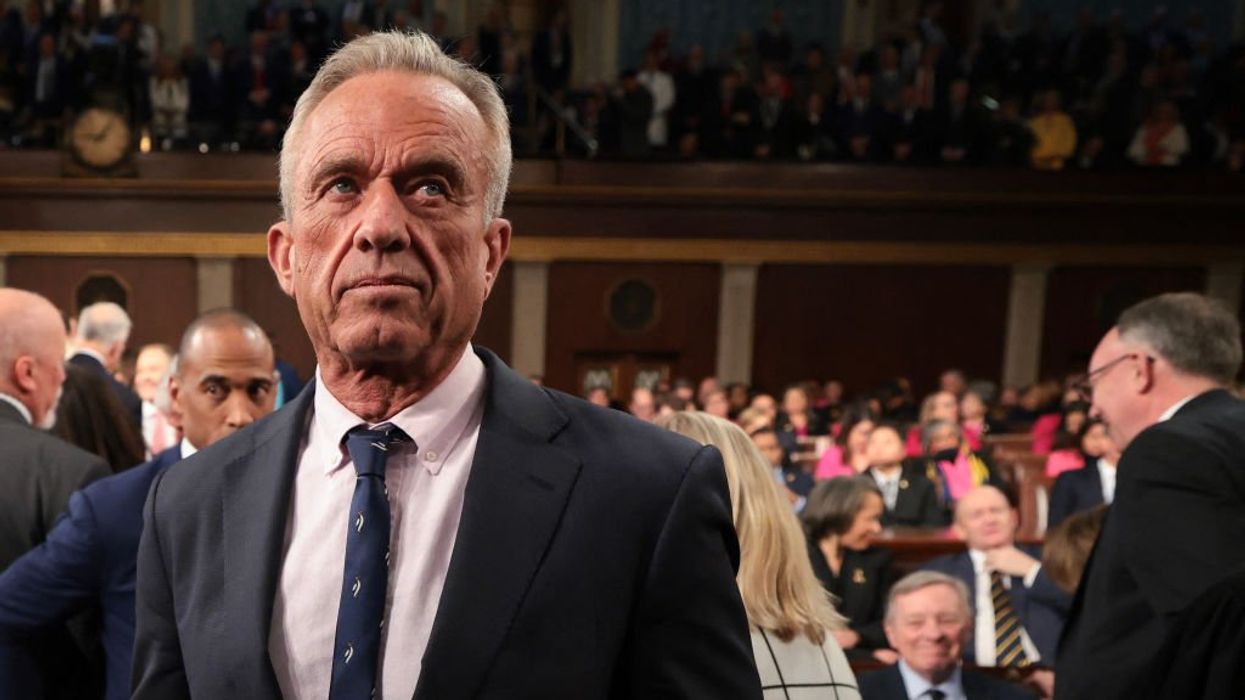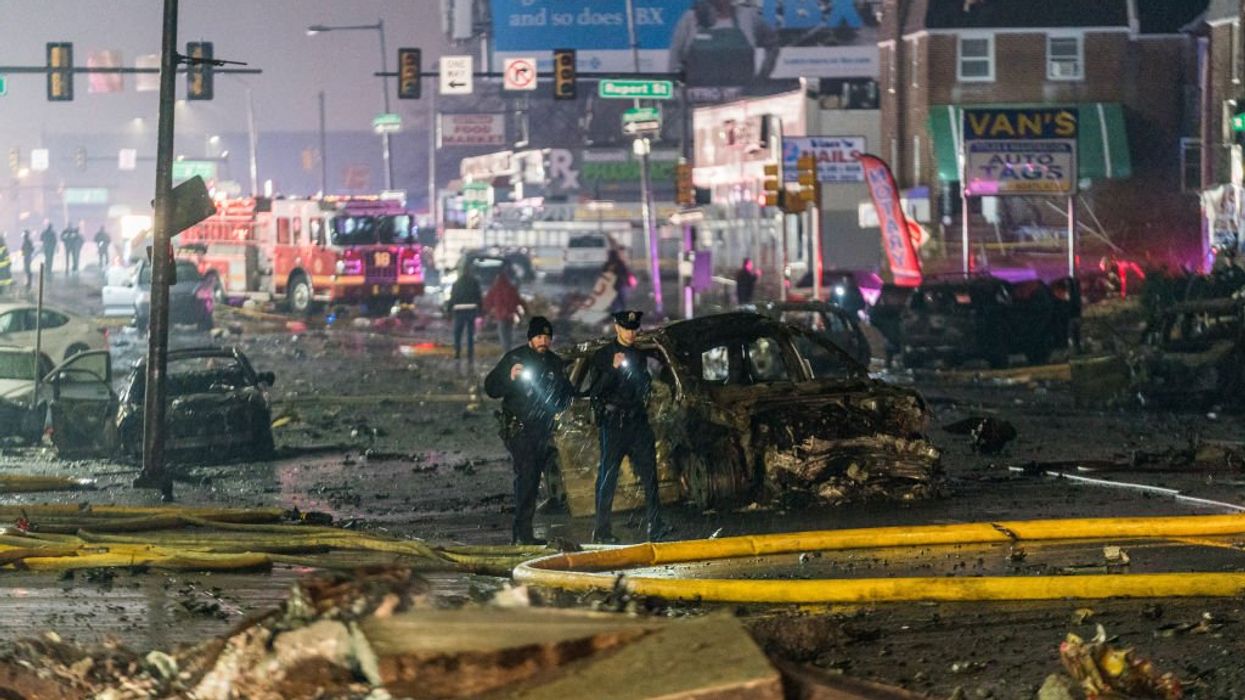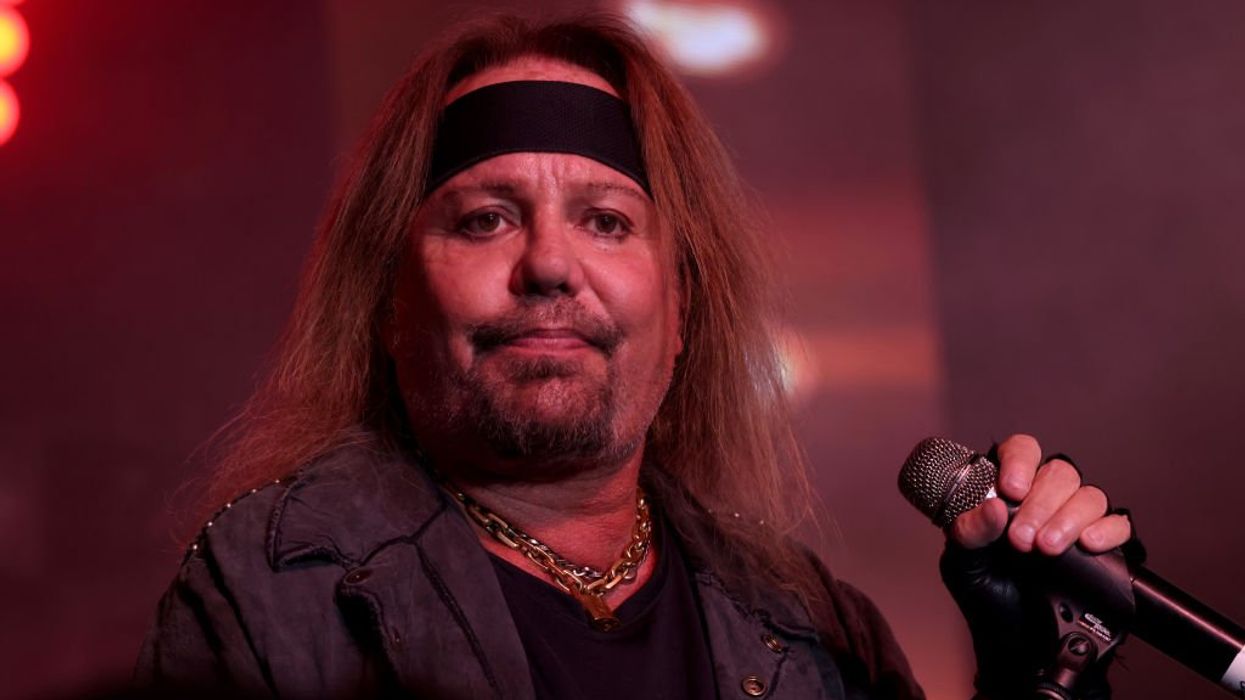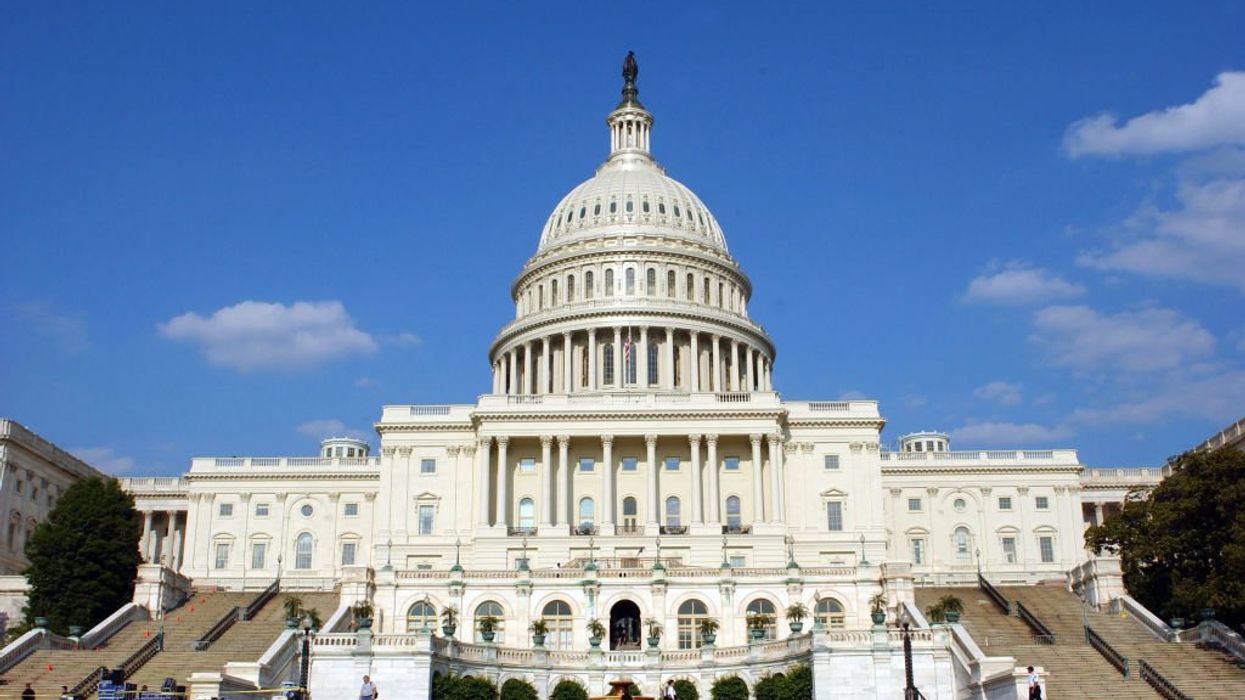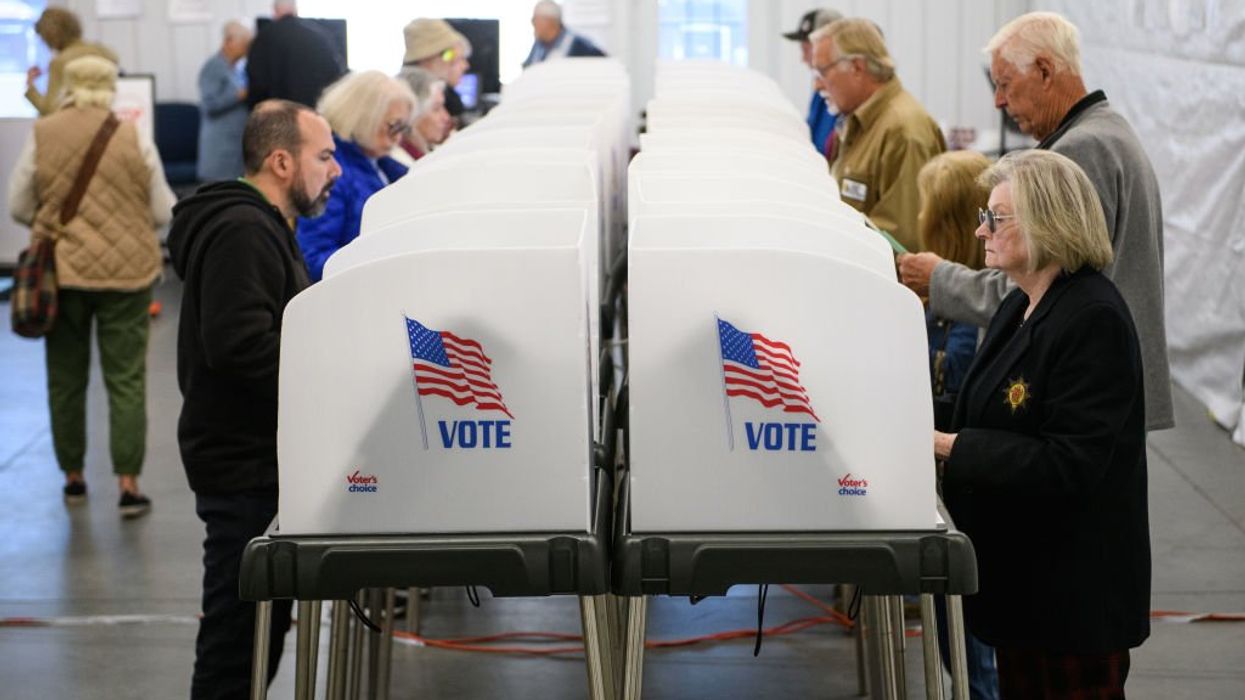Evan McMullin, a former CIA agent, officially entered the presidential race on Wednesday as an Independent candidate, hoping to offer Americans an alternative to what he believes are two terrible choices. He joined The Glenn Beck Program on Thursday to talk about why he's qualified to be president, the three major issues he believes America faces and why he's far better suited for the presidency than Donald Trump or Hillary Clinton.
Following the interview, Glenn asked his co-host what they thought about McMullin.
RELATED: PART 2: Glenn Talks With Independent Presidential Candidate Evan McMullin
"Generally liked him. He's better than some of the other choices," Stu said.
"Liked him," Pat said.
While McMullin appears to be a serious, worthwhile candidate, Glenn identified his biggest challenge:
"Is there enough time for people to listen to him and get comfortable with him? You know, let's see him in a debate. Somebody like that has got to be tested some way or another," Glenn said.
Listen to Part 1 of Glenn's interview with Evan McMullin on The Glenn Beck Program:
Below is a rush transcript of this segment, it might contain errors:
GLENN: Welcome to the Glenn Beck Program. We have Evan McMullin on. And want to get right to him. He is a guy who is running for president of the United States. He has just joined, and his background is quite extensive, but he's a name that nobody has really ever heard of. And we go to him now.
Evan, how are you, sir?
EVAN: I'm doing great, Glenn. How are you? Thanks for having me on.
GLENN: Very good. Let's get a quick look at your background first. Why are you qualified to be president of the United States?
EVAN: Well, I spent over ten years in the Central Intelligence Agency as an undercover operations officer serving overseas after 9/11 where I carried out covert operations against al-Qaeda and other terrorist groups, as well as other countries who are hostile to liberty, as I like to say. Then after that, I spent some time in the private sector in working with companies in a range of industries to help them compete globally and create jobs in the United States.
And then most recently, I've been on the Hill as a senior national security adviser, as well as the chief policy director for the house of Republicans, where I've learned a lot about what kind of reforms this government needs in order to be more accountable to the people, which is a huge issue for me.
So these are three major issues that the country faces: security, jobs, and government reform. And I think I'm very well suited, certainly far better suited than the two major candidates to deliver that.
GLENN: Tell me your thoughts about the Third Amendment to the Constitution.
EVAN: Yeah, well, let me say where I'm mostly focused on the Constitution: I'm a big Tenth Amendment guy. I do believe that power needs to be returned to the states. I think that we've got way too much power in Washington. This is where I'm focused: way too much power in Washington.
And what that means is that, if you're sitting in, say, Wyoming, if you're a voter in Wyoming, you're one of 440,000 people only who is voting in state elections. If you're in Wyoming and then, you know, like any American voting in a national election, you're one of 240 million, which means that your voice in Cheyenne is far more powerful than it is in Washington.
So, you know, I'm most interested in returning power to the states, returning power closer to the people. There are a lot of other things that need to be done to return power to the people, but that is really what I'm mostly focused on.
PAT: So quartering soldiers is not one of your biggest issues right now?
EVAN: No.
GLENN: That was kind of a trick question. I wanted to see if you knew what the Third Amendment was. But you definitely know what the Tenth Amendment is.
EVAN: Yeah.
GLENN: Tell me about the balance of power. How as a president of the United States -- what would you do to restore that?
EVAN: Well, the first thing is -- well, first of all, let me just say that it's a huge problem right now. I mean, over the last several decades -- and there are a number of reasons for this: Some laws that were passed and then some Supreme Court decisions that basically shifted a lot of Congress' power to the executive branch. And so now you have the executive branch, and I'm sure your listeners are aware of this. But, you know, the executive branch passes dozens and dozens of major rules and regulations every year that have major rules -- that those are rules that have an economic impact of over $100 million. And these have the force of law. And then the executive branch has the power to adjudicate complaints about them and then also to issue fines.
So, you know, they're behaving -- first of all, they're acting -- they're acting like Congress. They're taking Congress' power. They're also acting as though they're the judicial branch. There's -- there's no balance of power in that system, and so that needs to be changed.
We can't have the executive branch basically legislating on its own. So one of the things we need to do, there's a great bill out there called the REINS Act, which we've passed through -- went through the House, that would basically say, that if the executive branch issues a rule or regulation that is going to have an economic impact of $100 million and more -- and, you know, that's sort of -- there are other ways to sort of draw the threshold, but that's the way it's drawn in the bill -- that it has to get the approval of Congress. It can't just -- the executive branch can't just move forward with it without Congress' approval. I'm 100 percent supportive of this. I would sign it as soon as possible as president, and that would be a first step.
GLENN: The -- you've called Donald Trump inhuman.
EVAN: Yes.
GLENN: You want to elaborate on that or explain that?
EVAN: I would love to. I would sure love to.
Look, Donald Trump doesn't care about anyone but himself. I think that's been very, very clear through this campaign. I mean, this is a guy who attacks people with disabilities. I mean, what kind of person does that? This is a person who, you know, kicks babies out of his rallies. Who does that?
(laughter)
EVAN: He attacked -- actually he tends to attack the world's most vulnerable people, whether, you know, they're refugees or babies or, you know -- or people with disabilities. I mean, this is who this guy is. But it doesn't end there. He attacks -- he attacks our men and women who have served valiantly, who have given their lives for this country and their mothers. I mean, I just -- I just think -- I served for ten years in the CIA, put my life on the line countless times, and luckily walked away, you know, still alive. But others haven't. And I just think anybody who would pursue the Oval Office to be our commander-in-chief and who would disrespect our heroes and their families that way is somebody who is indeed inhuman.
GLENN: So let's just go through a couple things, if we could just do some rapid-fire.
EVAN: Sure. Let's do it.
GLENN: Where do you stand on guns?
EVAN: I'm a gun owner and strong supporter of the Second Amendment.
GLENN: Any restrictions on those? Any kind of common sense --
EVAN: Well, I do believe -- there's a system of background checks. And I support that. I think we need to have that, but, you know -- go ahead.
GLENN: Do we have enough laws, or do we need other new laws?
EVAN: Listen, this is -- this is the way I look at it: I'm concerned -- I do not trust the federal government -- I do not trust the federal government to be an honest broker in -- in a larger capacity. So I guess what I'm saying is that some people want certain checks to be done on certain purchases, and they want a national -- you know, a national system for that. I would rather -- if there's going to be something like that, I'd rather it be seen at the state level. I just think there's a real trust issue right now with the federal government, especially on the Second Amendment. So, you know, I'm open to discussions of certain ideas, but it's with the -- through the prism of not trusting the federal government over -- at least under this administration, over its desires to limit Second Amendment freedoms.
GLENN: Okay. All right. I've got about ten of these. I want to go as fast as I can. Taxes and the IRS.
EVAN: Well, I mean, what the IRS has done over the last several years has just been targeting people -- targeting groups based on ideologies. Absolutely terrible. I mean, in terms of taxes, I think we need a simplified tax code. I think we need lower taxes. The House of Representatives has a lot of great ideas that they've have put out recently under Paul Ryan's leadership. I support those. So that's in a nutshell -- if we're doing rapid-fire, I'll try to limit it.
GLENN: Universal health care.
EVAN: Not a supporter. I think we need a free market solution.
GLENN: Federalism.
EVAN: I could not be a bigger supporter.
GLENN: Von Mises.
EVAN: You got me there, Glenn.
GLENN: Von Mouses.
STU: Mises and Mouses.
EVAN: You got me. You got me.
GLENN: The government's role in education and Common Core.
EVAN: I don't think -- I don't think the federal government should be dictating to the states. I think this is a state and local issue, and that's my view.
GLENN: Eminent domain.
EVAN: I mean, there's a role for it to play, you know. There is a role. But I think it needs to be extremely limited. And Donald Trump's idea of it, you know, where he just wants to build hotels and parking lots and push people out of their homes, I think it's tyrannical, frankly.
GLENN: Abortion.
EVAN: Abortion, pro-life.
GLENN: Immigration.
EVAN: I believe we need to secure the border first and foremost. You know, it's the basic part of being a country. We've got to enforce our laws. Again, we're a country of laws. Rule of law is so critical to commerce and security and all of these things. We've got to do it. I do not -- I'll say, I think it's -- the idea that we're going to deport 11 million people, I think is unrealistic. So I'm not a supporter of that. But I do agree with Donald that we need to secure the border. But Donald has this idea that it has to be done with the wall across the whole thing. I talk to experts who tell me that in some places we need a wall, in other places we need a double wall, and in other places, a wall wouldn't help. So however it's done, I'm a little more agnostic, just as long as it gets the job done. We have to secure the border.
GLENN: ISIS. How to defeat them.
EVAN: Well, two things, and I think President Obama is failing miserably. And Hillary Clinton, you know, she's -- you know, she presided over our foreign policy at a time when al-Qaeda in Iraq was reconstituting itself and then becoming ISIS. So how she's capable to fight ISIS as our commander-in-chief, or qualified, is a mystery to me. And, of course, Donald Trump, I don't think is -- he's even less qualified.
But what I would say is two broad things: Number one, we have to be better about taking the fight to ISIS out there. We're just not serious right now. I mean, you know, President Obama is doing a few airstrikes here and there, but we need to step that up. We need to do a range of things to take the fight to them.
Yeah.
GLENN: How many of these isolated incidents and things like Fort Hood or the shootings that we have -- that have been isolated, we'll never know their motive, or it was just a lone gunman, not related to ISIS. For instance, the shooting at Fort Hood or the latest shooting in Orlando, do you buy that we'll never know their motive?
EVAN: No. I think it's clear. I mean, these are people who are unstable and then manipulated -- manipulated by Islamist radicals. I mean, that's what happens. And I think, Glenn, it's an interesting question. A lot of people want to say, okay. There's a terrorist attack. And they say, "All right. We've got to -- let's see if there was command and control from Pakistan or from Syria. And if there was command and control there. And if they were trained over there, and then they flew in here to do it, okay. Well, then that's a terrorist attack."
We have to get past that. We need to be -- we need to realize the enemy has moved on. The enemy has adapted to our successes in counterterrorism. And they've decided -- and this was a decision that Zawahiri made and that ISIS has made: They've decided -- excuse me -- to respond to our strengthening of our -- our -- our borders and what not, in some respects, and our intelligence service operations. They've responded to that by saying, "Okay. Well, we're just going to inspire crazies and those who are radical on -- you know, radical Islamists in the United States to carry out these things, and we're going to train them remotely and all of it." My point, Glenn, is that these kinds of attacks are just as much terrorist attacks as 9/11 itself. And we've got to finally get ourself to the point that we understand that. The enemy has adapted. We also must adapt.
GLENN: Okay. We're talking to Evan McMullin who is running for president. Evan McMullin.com. Evan, can we hold you for a few more minutes, or do you have to run?
EVAN: No, no. I've got time, Glenn.
GLENN: Okay. I'd like to take a break. We'll come back and maybe push you past the bottom of the hour as well because I want to hear your strategy. I want to hear why you're running. What your motivation is. What made you decide to do it and what your strategy is to win and not just be a spoiler. Evan McMullin.com.
(Break)
GLENN: He's running for president of the United States. And, Evan, I want to go into in-depth on this, but I think we have two minutes here.
EVAN: Okay.
GLENN: Tell me why you want to run for president of the United States.
EVAN: Well, let me just say that, like many Americans, millions of Americans, I was hoping -- I've been hoping against hope that someone else would step into this race because I think our two options are just terrible. I think Americans are very frustrated, and so was I. And not just frustrated, but very concerned about what these two candidates mean for our country. So I waited and hoped that somebody else would come forward. And no one did, and I realized no one was going to a couple of weeks ago. Had some conversations with people who were eager to launch an independent candidacy. And so ultimately, I decided to do it because other people weren't, candidly.
GLENN: Do you -- do you think you could win?
EVAN: Yeah, I do. I do think that there's a way we can win. And there are multiple paths towards it. I mean, we are going to be on ballots across the country through a variety of means. There are a number of ways that we can succeed. You know, 270 is -- reaching 270 is going to be difficult, but there are -- there are other means that we can prevail.
GLENN: What does that mean? What does that mean?
EVAN: Well, if we're able to move it into the House, we can prevail potentially there.
But let me say this, you mentioned something before the break about my being a spoiler. I want to make this very clear: I just entered the race a few days ago. When I entered the race, Donald Trump was losing to Hillary by ten percentage points. And at the same time, he continues to put his foot in his mouth, and I just -- Hillary Clinton is a weak candidate. We should be -- we should be doing very, very well against her.
GLENN: Yes.
EVAN: Conservatives should. And Donald Trump just isn't getting the job done. And he is ensuring that Hillary takes the White House. I'm concerned about that too. So he's already losing to her, and he is going to lose to her because he's an even weaker candidate than she is. I think with conservatives, we need somebody who can actually compete with Hillary head-on, and I know that I can do that. So that's where I am on this. And I'm trying to give people a better option here, something that they can be proud of, you know, somebody with a positive vision for the future of the country.
STU: If it does go to the House, what's your relationship with people in the House? I know obviously you came from that background recently, right?
EVAN: Yeah, I did. And I think the key here is that I understand what -- you know, certainly House Republicans are looking for. And I am in lockstep with them on, for example, balance of powers, the separation of powers, the REINS Act, things like that. And on policy. On -- you know, on their agenda. I'm with them. I was there as that was developed.
So, you know, Donald Trump is not there. Donald Trump, despite his campaign promises, this is not a guy who is going to be willing to send executive power that belongs to the legislative branch back to the legislative branch. I mean, Donald Trump is going to try to amass and consolidate power, given that he's an authoritarian.
GLENN: Okay. So hold on. I want to come back to you. We're going to have to break for a couple minutes. I want to come back to you and talk to you about the things that you think are the biggest problems that we're going to face, and then I want to ask you about some solutions. When we come back.
Featured Image: Former CIA agent Evan McMullin announces his presidential campaign as an Independent candidate on August 10, 2016 in Salt Lake City, Utah. Supporters gathered in downtown Salt Lake City for the launch of his Utah petition drive to collect the 1000 signatures McMullin needs to qualify for the presidential ballot. (Photo by George Frey/Getty Images)



